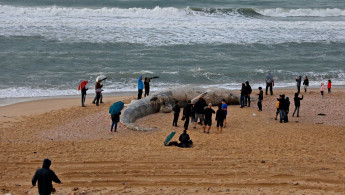Dead whale washes up on Israeli shore after storm
Powerful winds and unusually high waves pummelled Israel's entire Mediterranean coastline over Tuesday and Wednesday, with tonnes of tar staining beaches from Rosh Hanikra, just south of Lebanon, to Ashkelon just north of the besieged Gaza Strip.
The rare appearance of the dead whale, of the second-biggest mammal species in the world after the Blue Whale, was initially thought to have been connected to the tar pollution.
The tar, itself apparently released by a ship unloading oil or by old tar lifted by the storm from the seabed, killed many marine creatures.
That had sparked theories that the 16.9-metre (55-foot) male fin whale, weighing an estimated 25 tonnes, had also fallen victim to poisoning.
But Israel's Nature and Parks Authority said on Friday that experts had determined that the decayed state of the whale, discovered on Thursday at the southern Nitzanim beach near Ashkelon, meant it had died some two weeks ago.
"The whale's arrival cannot be linked to the tar pollution," the authority said in a statement.
The environmental protection ministry vowed to locate the source of the pollution, saying it was on a rare scale and that the cleanup was set to be "long and difficult".
Volunteers from a network of NGOs began cleaning up the beaches along with the ministry, which allocated emergency funds to the relevant municipalities to expedite the manual cleaning.
Follow us on Facebook, Twitter and Instagram to stay connected





 Follow the Middle East's top stories in English at The New Arab on Google News
Follow the Middle East's top stories in English at The New Arab on Google News
![The UAE is widely suspected of arming the RSF militia [Getty]](/sites/default/files/styles/image_330x185/public/2024-11/GettyImages-472529908.jpg?h=69f2b9d0&itok=Yauw3YTG)
![Netanyahu furiously denounced the ICC [Getty]](/sites/default/files/styles/image_330x185/public/2024-11/GettyImages-2169352575.jpg?h=199d8c1f&itok=-vRiruf5)
![Both Hamas and the Palestinian Authority welcomed the ICC arrest warrants [Getty]](/sites/default/files/styles/image_330x185/public/2024-11/GettyImages-2178351173.jpg?h=199d8c1f&itok=TV858iVg)